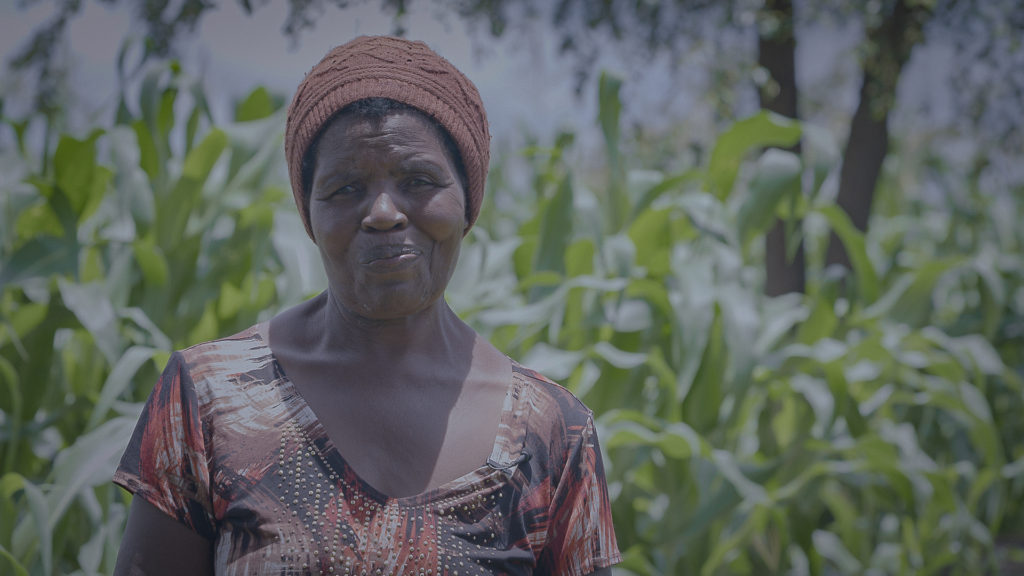Grandmother uses agriculture to triumph against personal crises.

It is just after lunch in Madziva, a farming village in the Shamva North District of Mashonaland Central in Zimbabwe.
Gogo Theresa Chikwenengere welcomes me into her homestead with a teeming smile.
At 72, she exhibits impressive fitness. I struggled to keep up despite being more than half her age.
An easy-going character, she wades straight into conversation, lamenting the sun, which she says may threaten an otherwise good yield in her plots.
She speaks authoritatively on yields; she was the second-best Climate Smart Agriculture (CSA) farmer in the Higherlife Foundation initiative in Shamva North during the 2021/2022 farming season.
Climate-smart agriculture is a conservation agriculture method, training communal farmers on ways they can make their farming more resilient to adverse weather conditions.
For this joyful character, award-winning plots and respected agricultural knowledge masks a deeper story of adversity.
“My husband had been sick for three years when I joined the Higherlife Foundation CSA initiative.
“He used to be a headman, but his health deteriorated over the years, and he lost sight. He would sometimes lose his mind,” said Gogo Chikwenengere.
Her husband’s condition demanded her strong attention and a constant act of balancing field work with taking care of him.
“I would find him sitting where I left him. I had to devise a schedule where I would feed and clean him in the morning, return in the afternoon to bathe him and then return to the field,” she says.
The only help she would get was from her one child and six grandchildren – when they were not in school.
On top of looking after her ailing husband, she is a guardian to her grandchildren, whose parents are scattered around Harare and South Africa, seeking opportunities.
“My youngest grandchild is called Beyonce; she is still a toddler. Four are in school. The eldest of my grandchildren finished school but is not yet employed. He is trying his hand as a kombi conductor,” says Gogo Chikwenengere.
Kombi is a ChiShona colloquial term for public transport buses in Zimbabwe.
As Gogo Chikwenengere tried to balance caregiving, hyperactive grandchildren and feeding the family, she heard of Higherlife Foundation’s Climate Smart Agriculture Initiative. Desperate to grow her yield, she enrolled.
“I dug holes, sowed, and did my mulch. The water appeared to have been delayed, and I watered the holes using a watering can, drawing water from our well. My grandchildren offered to help me, but there were tasks I believed needed me to do everything according to the specifications we got,” she said.
That extra effort saw her outperforming her peers, save for only one person in the whole of Shamva North District.
“People would ask me how my maize is looking good. I did not have much to tell them except that I did not plant in dry holes, so my seeds germinated healthily,” says Gogo Chikwenengere.
She has had to set time aside to explain some of her methods to her neighbours, becoming the village extension worker.
Never in her wildest dreams did she imagine herself playing this role.
“I used to get ten bags from the plot I planted on. I was sceptical of the program when it came, but I was pleasantly surprised when I harvested 17 bags from the same space,” she says.
During her great tribulation, the sprouting field was her solace, as farming felt like the only thing going right for her.
“I remember when we had a field day here when I was announced as number two, my husband was in the house sleeping. I had to stay strong for him because he was a farmer of note during his healthy days,” says Gogo Chikwenengere.
Sekuru Chikwenengere died in July 2022.
“He had struggled for a long time and had to rest. I now continue to fight, taking the family forward. I increased the size of the plots I am working on this year, as I no longer had to split time between looking after Sekuru and the field,” she said.
Gogo Chikwenengere hopes to be among the country’s best climate-smart farmers one day.
“This year, I did not water my holes. I waited for the rain. I hope that does not cost me my position. However, the crop is looking healthy so far,” she says.
The climate-smart agriculture method used by Gogo Chikwenengere and others under the initiative is sometimes described as farming God’s way.
The euphemism derives from the simplicity of the method adopted in Zimbabwe in response to the effects of climate change.
It gives farmers a fighting chance, even in difficult weather conditions.
For Gogo Chikwenengere, the CSA initiative became more than an opportunity to grow food for her family but a chance to remain sane in the face of family challenges.


